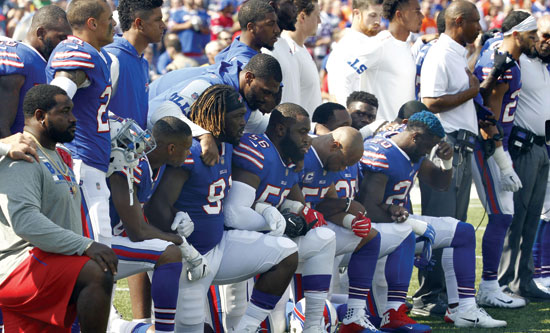
In an unprecedented display of solidarity, over 200 National Football League players from most of its 32 teams knelt in protest during the national anthem before their games on 24 September. This collective act of defiance came after US President Donald Trump attacked NFL players who have protested against racist police brutality, the latest example of which came on 16 September when a police officer was acquitted of murdering 24-year-old Anthony Lamar Smith in St Louis, Missouri. At a Republican rally in Huntsville, Alabama on 22 September, Trump said: ‘Wouldn’t you love to see one of these NFL owners, when somebody disrespects our flag, to say, “Get that son of a bitch off the field right now. Out! He’s fired!”’
In response, NFL players – 70% of whom are black – have decided to come together as a ‘brotherhood’. The Pittsburgh Steelers, Seattle Seahawks and Cincinnati Bengals did not even come out onto the field during the anthem on 24 September. More than half the NFL teams have issued statements condemning Trump’s comments as an assault on the freedom of political expression. ‘Take a knee’ protests have spread to the men’s and women’s National Basketball Association and Major League Baseball.
Some Miami Dolphins NFL players have worn ‘#IamwithKap’ warm-up T-shirts in solidarity with Colin Kaepernick, who began kneeling – on his own – during pre-match national anthems in August 2016 in protest against racist police brutality. Kaepernick, who has openly praised the late Fidel Castro, sparked a national controversy and sacrificed his career – the San Francisco 49ers let him go at the end of the season and he remains unsigned. ‘I am not going to stand up to show pride in a flag for a country that oppresses black people and people of colour,’ he said. ‘There are bodies in the street and [police] getting paid leave and getting away with murder.’
Kaepernick’s treatment has led to calls for an NFL boycott. He has just been voted the NFL Players Association’s ‘most valuable player’ for charitable work in black and ethnic minority communities, especially for his ‘Know Your Rights’ seminars that help to empower oppressed youth.
Kaepernick continued his protests until he was effectively ‘fired’, having received only limited support from colleagues. Now the vast majority of players have suddenly followed his example, there is a risk that his message is being diluted to one that is simply against Trump’s presidency – Barack Obama of course was still President when Kaepernick started this. Even NFL owners, who are all white, have appeared ‘taking a knee’. As black NFL pundit Shannon Sharpe said, the league’s billionaire owners have only done so because they ‘don’t like being told what to do by a bully like Trump … they gave $1m to the Trump inauguration, and now they seem to be shocked. Their conscience wasn’t shocked when Trump said he would build a wall to keep out Mexicans.’
Nevertheless, the controversy has been reignited, keeping the questions that Kaepernick raised in the spotlight. His brave stand harks back to the 1960s when sport played a high profile role in the fight against racism, such as when John Carlos and Tommie Smith gave the black power salute at the 1968 Olympic Games in Mexico.
Indeed, Trump’s ascendency has once again laid bare the unresolved issues of the 1960s civil rights movement. As Gary Younge wrote in The Guardian (26 September): ‘Black Americans are far more likely than white people to be stopped, frisked, arrested, jailed, shot and executed by the state, while the racial gaps in unemployment are the same as 40 years ago, the racial disparity in wealth and income is worse than 50 years ago. They have the right to eat in any restaurant they wish; the trouble is, many can’t afford what’s on the menu.’
Having Trump in the White House has emboldened fascists who claim that ‘white America is under attack’. Almost half of all white people in the US claim to feel this way. It is no coincidence that the US’s largest police union, the Fraternal Order of Police, also backed Trump for the presidency.
After the acquittal of the police officer in St Louis, police marched through the city chanting ‘Whose streets? Our streets!’ They were mocking Black Lives Matter and other anti-racist movements.
While the ‘take a knee’ protests are symbolically powerful, it is clear that the fight against racism in the US must go much further. But sport is once again playing an important role in the reawakening of black consciousness. As DeMaurice Smith, president of the NFL Players Association, said: ‘We will never back down. We no longer can afford to stick to sports.’
Fight Racism! Fight Imperialism! 260 October/November 2017
Barnaby Philips




